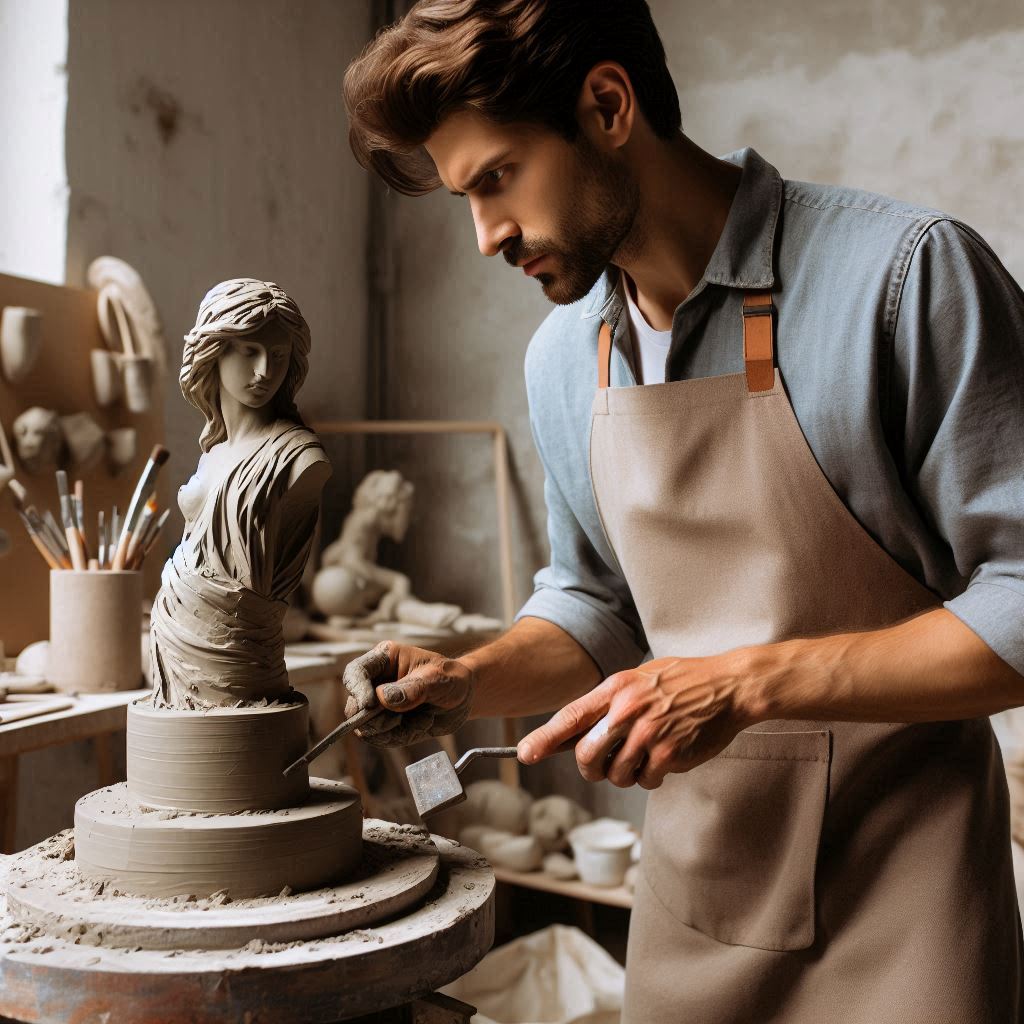Introduction
In today’s competitive art world, sculptors and artists must master more than just their craft.
Business skills are crucial for achieving success and sustainability in their careers.
While artistic talent is indispensable, effective business practices can propel artists to new heights.
Understanding and implementing these skills can transform an artistic hobby into a thriving business.
Business acumen is vital for sculptors and artists to navigate their careers efficiently.
Artists often focus solely on their creative work, but without business skills, they may struggle with managing their finances, marketing their art, and handling contracts.
Business skills provide a foundation for managing time, resources, and opportunities effectively.
Effective marketing is one area where business skills play a pivotal role.
Artists must promote their work to attract clients, galleries, and exhibitions.
Knowing how to create a compelling portfolio, build an online presence, and network within the art community can significantly boost an artist’s visibility and opportunities.
Financial management is another critical skill.
Sculptors and artists need to budget, price their work appropriately, and track expenses and income.
Proper financial planning ensures that artists can sustain their practice and invest in necessary resources without falling into debt.
Additionally, legal knowledge helps artists navigate contracts and intellectual property rights.
Understanding these aspects protects their work and ensures fair compensation.
Knowledge of contracts and legal obligations is essential for negotiating with galleries, buyers, and collaborators.
In summary, business skills are not just an accessory but a necessity for sculptors and artists.
Mastering these skills can enhance their ability to manage their careers effectively, promote their work, and achieve long-term success.
By blending artistic talent with business expertise, artists can thrive in their creative endeavors and build a sustainable career.
Understanding of Market Trends
Researching Current Market Trends in the Art Industry
Staying updated with market trends is crucial for sculptors and artists.
Transform Your Career Today
Unlock a personalized career strategy that drives real results. Get tailored advice and a roadmap designed just for you.
Start NowBegin by following art market reports and industry news.
Attend art fairs, exhibitions, and gallery openings to observe emerging trends.
Subscribe to art magazines and online platforms to gain insights into current preferences and market shifts.
Analyzing these resources will provide a broad understanding of what styles, themes, and techniques are gaining popularity.
Regularly engaging with art communities on social media can also offer real-time updates and discussions on market trends.
This knowledge will help artists align their work with what is currently in demand.
Analyzing Demand for Different Types of Sculptures
Understanding what types of sculptures are in demand can guide your creative and business decisions.
Start by studying sales data from galleries and art auctions.
Note which styles, materials, and themes are fetching higher prices.
Look for patterns in what collectors and buyers are interested in.
For example, modern abstract pieces might be trending, or there may be a growing interest in eco-friendly materials.
Use this information to tailor your creations to meet market demands.
This approach not only increases your chances of selling but also ensures your work resonates with current buyer interests.
Identifying Potential Opportunities for Artists to Capitalize On
Identifying and seizing opportunities can elevate your career as an artist.
Look for gaps in the market where demand exceeds supply.
Consider collaborating with brands or institutions seeking unique art pieces.
Explore opportunities to participate in themed exhibitions or public art projects.
Leverage your understanding of market trends to position yourself strategically.
Offer limited editions or custom commissions that cater to specific client needs.
Use social media and networking events to promote your work and reach potential buyers.
Transform Your Career Today
Unlock a personalized career strategy that drives real results. Get tailored advice and a roadmap designed just for you.
Start NowBy capitalizing on these opportunities, you can expand your audience and increase your market presence.
Understanding market trends is essential for sculptors and artists aiming to thrive in a competitive industry.
By researching trends, analyzing demand, and identifying opportunities, you can enhance your market presence and achieve greater success.
Read: Balancing Creativity and Technique in Printmaking
Financial Literacy
As a sculptor or artist, mastering financial literacy is crucial for your long-term success in the industry.
Here are some key aspects of financial literacy that every sculptor and artist should focus on:
Understanding basic financial concepts such as budgeting and pricing
Budgeting is essential for keeping track of your expenses and ensuring that you stay within your financial limits.
As a sculptor or artist, you need to allocate funds for materials, studio rent, marketing, and other expenses.
By creating a budget, you can prioritize your spending and avoid financial instability.
Pricing your artwork correctly is also crucial for your financial success.
You need to consider factors such as the time spent on creating the piece, the cost of materials, and your expertise when determining the price of your artwork.
Understanding how to price your work competitively while ensuring you cover your costs and make a profit is key to sustaining your art business.
Learning how to manage expenses and create a sustainable income stream
Managing expenses is vital for maintaining a healthy financial position as a sculptor or artist.
By tracking your expenses, you can identify areas where you can cut costs and allocate more funds to essential aspects of your art practice.
Additionally, creating multiple income streams, such as selling artwork, teaching workshops, or offering commissions, can help you generate a stable income and mitigate financial risks.
Familiarizing oneself with taxes and other financial responsibilities
As a self-employed artist or sculptor, you are responsible for managing your taxes and complying with financial regulations.
Understanding how to file taxes, keep accurate financial records, and account for expenses can help you avoid penalties and legal issues.
Consulting with a financial advisor or accountant specializing in creative businesses can provide valuable guidance on navigating tax obligations and ensuring financial compliance.
In short, financial literacy plays a significant role in the success of sculptors and artists.
By understanding basic financial concepts, managing expenses effectively, and complying with financial responsibilities, you can build a sustainable art practice and thrive in the competitive art industry.
Transform Your Career Today
Unlock a personalized career strategy that drives real results. Get tailored advice and a roadmap designed just for you.
Start NowContinuously educating yourself on financial matters and seeking professional guidance when needed can set you up for long-term financial stability and success as a sculptor or artist.
Read: Working with Galleries: Tips for Emerging Sculptors
Marketing and Branding
Marketing and branding are essential skills for sculptors and artists to succeed in the competitive art world.
Building a strong personal brand can set you apart from other artists and attract more clients and opportunities.
Developing a personal brand as an artist
Your personal brand is what sets you apart from other artists.
It is the unique combination of your style, values, and personality that make your work stand out.
To develop your personal brand, start by defining what makes your artwork unique.
What themes, techniques, or materials do you use that set you apart from other artists?
Once you have a clear understanding of your unique selling points, communicate them consistently across all your marketing materials, from your website to your social media profiles.
Utilizing social media and online platforms to showcase artwork
In today’s digital age, social media and online platforms are powerful tools for artists to showcase their work to a global audience.
Create a strong online presence by sharing high-quality images of your artwork on platforms like Instagram, Facebook, and Twitter.
Engage with your followers by posting behind-the-scenes photos, videos, and stories that give them a glimpse into your creative process.
By consistently sharing your work online, you can attract new followers, build your brand, and increase your visibility in the art community.
Implementing marketing strategies to reach a wider audience
Marketing is essential for reaching a wider audience and attracting new clients to your art business.
Consider implementing various marketing strategies, such as email marketing, content marketing, and search engine optimization (SEO), to promote your work to potential buyers.
Collaborate with galleries, art fairs, and other artists to expand your reach and connect with art collectors and enthusiasts.
By consistently promoting your work through strategic marketing efforts, you can grow your client base, increase sales, and build a successful career as a sculptor or artist.
Read: Printmaking in Fashion and Textile Design

Networking and Collaboration
Building relationships with other artists, galleries, and potential clients is a crucial skill for sculptors and artists.
This network can provide support, inspiration, and even lead to new opportunities.
Transform Your Career Today
Unlock a personalized career strategy that drives real results. Get tailored advice and a roadmap designed just for you.
Start NowHere are some key points to consider when it comes to networking and collaboration:
Building Relationships with Other Artists, Galleries, and Potential Clients
One of the first steps in networking is reaching out to other artists, galleries, and potential clients.
This can be done through attending art events, joining art associations, or simply reaching out online.
By building relationships with these individuals, you can expand your reach and create a supportive community.
Collaborating with Other Creatives to Expand Artistic Opportunities
Collaboration is a powerful tool for artists to explore new ideas and expand their artistic opportunities.
By working with other creatives, you can combine your skills and perspectives to create innovative and compelling work.
Collaboration can also introduce you to new audiences and help you showcase your work in different settings.
Attending Events and Exhibitions to Connect with Industry Professionals
Attending events and exhibitions is a great way to connect with industry professionals and expand your network.
By engaging with curators, collectors, and other artists at these events, you can gain valuable insights, feedback, and potentially even secure new opportunities to exhibit your work.
Additionally, being present at these events helps you stay updated on the latest trends and developments in the art world.
Networking and collaboration are essential skills for sculptors and artists looking to grow their careers and reach new audiences.
By actively engaging with others in the industry, you can build a strong support system, find new artistic opportunities, and stay connected to the ever-evolving art world.
Read: Art Exhibitions: Showcasing Your Sculpture Work
Time Management
Time management is a crucial skill for sculptors and artists to master to ensure they can succeed in their careers.
By effectively managing their time, artists can maximize their productivity, meet deadlines, and maintain a healthy work-life balance.
Prioritizing tasks and setting realistic deadlines for projects
One of the first steps in effective time management is prioritizing tasks.
Sculptors and artists should identify tasks that are urgent and important and focus on completing those first.
By setting realistic deadlines for projects, artists can avoid the stress of last-minute rushes and ensure high-quality work.
Creating a schedule to balance artistic work with business responsibilities
Many artists struggle to balance their artistic work with the business side of their careers.
By creating a schedule that includes time for creating art, marketing, networking, and other business activities, artists can ensure they are addressing all aspects of their careers.
Transform Your Career Today
Unlock a personalized career strategy that drives real results. Get tailored advice and a roadmap designed just for you.
Start NowThis balance is essential for long-term success in the art world.
Improving productivity by effectively managing time
Effective time management can significantly improve productivity for sculptors and artists.
By breaking down larger projects into smaller tasks, setting deadlines, and eliminating distractions, artists can focus on their work and accomplish more in less time.
This increased productivity can lead to more opportunities, increased income, and overall career growth.
In essence, mastering time management is essential for sculptors and artists looking to succeed in their careers.
By prioritizing tasks, creating a balanced schedule, and improving productivity, artists can maximize their potential and achieve their artistic goals.
Negotiation and Communication Skills
Negotiating Contracts and Pricing with Clients and Galleries
Negotiation is key for sculptors and artists when dealing with contracts and pricing.
Start by researching industry standards to understand typical pricing structures.
Be clear about your needs and expectations upfront.
When negotiating with clients or galleries, articulate the value of your work confidently.
Discuss terms like payment schedules, deadlines, and rights to the artwork.
Use written contracts to formalize agreements, ensuring all parties are clear about their commitments.
Remember to be flexible but firm in your negotiations to secure fair compensation.
Communicating Effectively with Partners and Collaborators
Effective communication with partners and collaborators fosters successful projects.
Maintain open lines of communication throughout the creative process.
Clearly outline roles, responsibilities, and expectations from the beginning.
Use regular updates and meetings to share progress and address concerns.
Practice active listening to understand others’ viewpoints and feedback.
When presenting ideas, be clear and concise to avoid misunderstandings.
Strong communication skills help build trust and ensure that everyone involved is aligned with the project’s goals.
Transform Your Career Today
Unlock a personalized career strategy that drives real results. Get tailored advice and a roadmap designed just for you.
Start NowResolving Conflicts and Misunderstandings Professionally
Conflicts and misunderstandings are inevitable in collaborative environments.
Address issues promptly to prevent escalation.
Approach conflicts with a solution-oriented mindset, focusing on resolving the issue rather than assigning blame.
Use clear and respectful language when discussing problems.
Seek to understand the other party’s perspective and find common ground.
If necessary, involve a neutral third party to mediate the situation.
Professionalism in handling conflicts maintains positive relationships and ensures ongoing successful collaborations.
Effective conflict resolution contributes to a smoother creative process and stronger partnerships.
Legal Knowledge
As a sculptor or artist, having a good understanding of legal matters is essential to protect your creative work and ensure that you are adequately compensated for your efforts.
Here are some key legal skills that every sculptor and artist should possess:
Understanding Intellectual Property Rights and Copyright Laws
One of the most important legal aspects for sculptors and artists to grasp is intellectual property rights and copyright laws.
This includes understanding how to protect your original creations from being copied or used without your permission.
By having a solid understanding of these laws, you can safeguard your work and prevent others from profiting off of your ideas.
Creating Contracts to Protect Artwork and Secure Deals
Contracts are an essential tool for artists and sculptors when it comes to protecting their artwork and securing deals with clients or galleries.
By creating clear and detailed contracts, you can outline the terms of the agreement, specify how your work can be used, and ensure that you are fairly compensated for your efforts.
Having well-drafted contracts in place can help prevent misunderstandings and legal disputes down the line.
Seeking Legal Advice When Necessary to Navigate Complex Legal Issues
While it’s important to have a basic understanding of legal matters as a sculptor or artist, there may be times when you encounter complex legal issues that require professional guidance.
In such situations, it’s advisable to seek legal advice from a qualified attorney who specializes in intellectual property and art law.
An experienced lawyer can provide you with valuable insights and help you navigate legal challenges effectively, ensuring that your rights are protected and your interests are represented.
Overall, having a strong grasp of legal knowledge is crucial for sculptors and artists to protect their creative work, secure deals, and navigate the intricacies of the art world.
Transform Your Career Today
Unlock a personalized career strategy that drives real results. Get tailored advice and a roadmap designed just for you.
Start NowBy understanding intellectual property rights, creating contracts, and seeking legal advice when needed, artists can safeguard their rights and build successful careers in the competitive art industry.
Continuous Learning and Growth
As a sculptor or artist, continuous learning and growth are essential for staying relevant and improving your craft.
Here are some key ways to embrace this mindset:
Engaging in Professional Development Opportunities
One of the best ways to enhance your skills and broaden your artistic horizons is to participate in professional development opportunities.
This could include attending workshops, classes, or conferences that focus on techniques, materials, or conceptual ideas related to sculpture and art.
By learning from experienced professionals and interacting with other artists, you can gain valuable insights and inspiration that can take your work to the next level.
Additionally, these opportunities allow you to network and build connections within the industry, opening up new possibilities for collaboration and growth.
Staying Updated on Industry Trends and Best Practices
Art is a constantly evolving field, with new trends and practices emerging all the time.
To stay relevant and competitive as a sculptor or artist, it’s important to stay informed about what’s happening in the industry.
Follow art blogs, attend exhibitions, and subscribe to industry magazines to keep up to date with the latest developments.
By staying informed, you can incorporate new ideas and techniques into your work, keeping it fresh and engaging for your audience.
Seeking Feedback and Critiques
Feedback is a valuable tool for artists looking to improve their practice.
Whether from other artists, mentors, or art critics, receiving constructive criticism can help you see your work from a different perspective and identify areas for growth.
Seek out opportunities to have your work reviewed and critiqued, whether through formal critiques at art schools or informal discussions with peers.
Constructive feedback can help you refine your artistic voice, develop your skills, and create more impactful and meaningful art.
Most importantly, continuous learning and growth are essential for sculptors and artists looking to thrive in their practice.
By engaging in professional development opportunities, staying updated on industry trends, and seeking feedback and critiques, you can push yourself to new heights and create work that resonates with audiences and peers alike.
Conclusion
The importance of business skills for sculptors and artists cannot be overstated.
These skills are essential for artists to thrive in their careers and achieve success.
Without a solid understanding of business principles, artists may struggle to market their work, manage their finances, and navigate the art world effectively.
Transform Your Career Today
Unlock a personalized career strategy that drives real results. Get tailored advice and a roadmap designed just for you.
Start NowIt is crucial for artists to invest time and effort in developing their business skills.
By doing so, they can increase their chances of success and create more opportunities for themselves in the competitive art market.
With the right business skills, artists can better promote their work, build a strong professional network, and sustain a sustainable career in the arts.
[E-Books for Sale]
The Big Book of 500 High-Paying Jobs in America: Unlock Your Earning Potential
$19.99 • 500 High-Paying Jobs • 330 pages
Explore 500 high-paying jobs in America and learn how to boost your career, earn more, and achieve success!
See All 500 High-Paying Jobs of this E-Book
1001 Professions Without a Degree: High-Paying American Jobs You Can Start Now
$19.99 • 1001 Professions Without a Degree • 174 pages
Discover 1001 high-paying jobs without a degree! Unlock career tips, skills, and success strategies for just $19.99!




